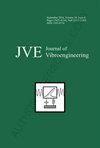Model test and numerical analysis of height restriction frame to over-height vehicle impact
IF 0.9
Q4 ENGINEERING, MECHANICAL
引用次数: 0
Abstract
This study develops a simplified model incorporating an over-height vehicle and the height restriction frame (HRF) to explore the failure modes and mechanical properties of the HRF when subjected to an impact from the over-height vehicle. Within the study context, rigorous model tests have been constructed for simulation analysis. The validity of these numerical simulations is confirmed by comparing the test results to the calculated outcomes. The study also analyzes the dynamic response of vehicles varying in speed and weight when impacting the HRF. The findings reveal that most of the beam's displacement can be attributed to the column's overturning, while a lesser portion is due to the plastic deformation of the beam. The column's displacement is primarily caused by its own overturning. Both the beam and the column's base demonstrate evidence of elastoplastic deformation. It is observed that the displacement and stress of crucial nodes rise with the increase in vehicle speed and weight. Vehicle speed emerges as the predominant factor influencing the impact force of the vehicle when compared to the vehicle's weight. Furthermore, the increase in vehicle weight extends the collision time between the vehicle and the HRF, indicating that the weight of the vehicle plays a significant role in the column's overturning. The study findings can potentially serve as both an experimental and theoretical reference for the design and calculation of the HRF.超高车辆撞击限高架的模型试验和数值分析
本研究开发了一个包含超高车辆和限高架(HRF)的简化模型,以探索限高架在受到超高车辆撞击时的失效模式和机械性能。在研究范围内,建立了用于模拟分析的严格模型试验。通过将测试结果与计算结果进行比较,确认了这些数值模拟的有效性。研究还分析了不同速度和重量的车辆在撞击 HRF 时的动态响应。研究结果表明,横梁的大部分位移可归因于支柱的倾覆,而较小部分则是由于横梁的塑性变形。柱的位移主要是由其自身的倾覆引起的。梁和柱的底座都有弹塑性变形的迹象。据观察,关键节点的位移和应力随着车速和重量的增加而增加。与车重相比,车速是影响车辆冲击力的主要因素。此外,车辆重量的增加延长了车辆与 HRF 之间的碰撞时间,这表明车辆重量在立柱倾覆中起着重要作用。研究结果可为 HRF 的设计和计算提供实验和理论参考。
本文章由计算机程序翻译,如有差异,请以英文原文为准。
求助全文
约1分钟内获得全文
求助全文
来源期刊

Journal of Vibroengineering
工程技术-工程:机械
CiteScore
1.70
自引率
0.00%
发文量
97
审稿时长
4.5 months
期刊介绍:
Journal of VIBROENGINEERING (JVE) ISSN 1392-8716 is a prestigious peer reviewed International Journal specializing in theoretical and practical aspects of Vibration Engineering. It is indexed in ESCI and other major databases. Published every 1.5 months (8 times yearly), the journal attracts attention from the International Engineering Community.
 求助内容:
求助内容: 应助结果提醒方式:
应助结果提醒方式:


